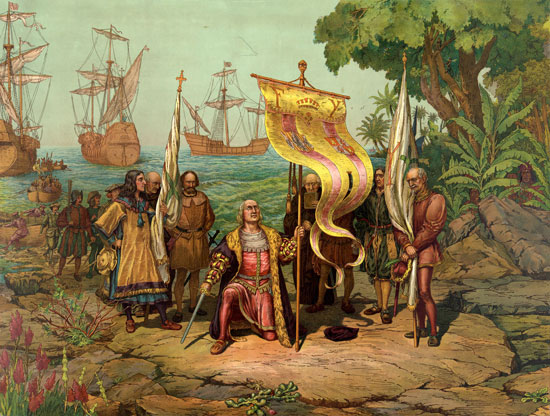Columbus was only one of many famous explorers, and he never actually got to the North American continent. So, why celebrate Columbus?

As early as 1792, there were official celebrations of Columbus’s voyage. In 1934, in response to lobbying by Italian immigrants, Congress passed a resolution asking the president to designate October 12 as Columbus Day. President Roosevelt signed a proclamation in 1937, but it was still not a federal holiday. In 1968, in honor of Columbus as an example of the courage and determination of all immigrants who have come to America, Congress decided to create a legal public holiday to be celebrated on the second Monday of October each year.
But Columbus’s arrival in the New World actually opened the door for major changes no one wants to celebrate. Europeans brought enslavement and death to thousands of people in the Americas. If humans were simply advanced primates, perhaps these acts could be explained as necessary for the survival of the fittest. But human beings are image-bearers of God (Genesis 1:27), and the Bible teaches that that people are to love their neighbors (Mark 12:31). A Christian cannot please God by celebrating or even by ignoring the death or mistreatment of other people.
The real question is whether you can celebrate the good that someone does without talking about the evil that he does. The Bible gives us guidance on that. As the Old Testament accounts show, God used people like Abraham, Sarah, Jacob, and David despite their failings and sins. But God does not whitewash their history. In each case He details both their successes and their failures to love God and their neighbors. However, God does not always feel compelled to give both sides. In Hebrews 11 there is a list of heroes of faith. God mentions Abraham, Sarah, Jacob, and David, but not their failures. The list even includes Rahab, Samson, and Jephthah, all of whom were conspicuous for sinfulness! Why are they in this chapter? It’s not that the failures don’t matter. God spent a lot of time talking about their failures in other places. It’s just that a person is not simply the sum of his failures; he is also a product of grace working in his life.
When historian Felipe Fernández-Armesto took up the question of whether Columbus was a saint or criminal, he concluded on the five-hundredth anniversary of his famous voyage that “the real Columbus was a mixture of virtues and vices like the rest of us, not conspicuously good or just, but generally well-intentioned, who grappled creditably with intractable problems.”
So what can you celebrate on Columbus Day? Celebrate the truth. Remember that early explorers such as Columbus courageously faced enormous obstacles and persevered. Acknowledge the fact that many also sinned against their fellow human beings. Recognize that in spite of man’s sinfulness, God is gracious. Thank God for the good, and learn from the bad. For Christians, Columbus is a reminder that we are all sinners desperately in need of the grace of God.